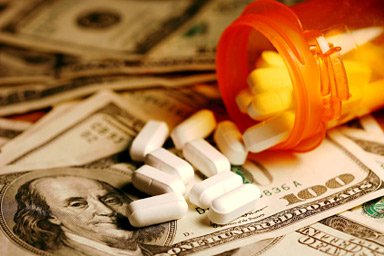
If you were living in the wilderness (by choice or by tradition) and had a headache, what can you do? Bang your head on a rock, or wait, Nature is here to the rescue. There's a traditionnal medicine out there, found in the bark of the willow tree! Boil the bark, drink it, and your ailment is alleviated. You sprained your ankle while trying to catch that hare to feed your family and you are having an excruciating pain? No problem, go see the shaman and inhale the ritualistic fumes of cannabis for a long lasting pain relief. You'll be up and running in a few days. You're exhausted in the jungle trying to hunt that boar? No problem, chew a few coca leaves and you'll get that extra kick to finish the hunt.
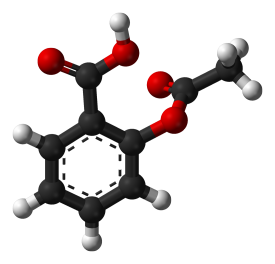
ASA (acetylsalicylic acid) was first synthesized in the mid 19th century. A few decades later, the drug and dye company Bayer (yes, them, again) researched and discovered a more efficient way to synthesize ASA, and by 1899 it was dubbed Aspirin and was sold all over the world. ASA and many of its derivatives are readily found in several plants nature. It's been used for millenia to alleviate pain and inflammation. Bayer smartly capitalized on that and commercialized ASA, oops, I mean Aspirin. However, in the following years, Bayer faced a struggle to uphold its patent on the drug, some countries transiently accepted the patent, others rejected it. Bayer ultimately lost the trademark and today "aspirin" has become a generic word internationally. But, "Aspirin" with a capital A remains a registered trademark of Bayer. Now you understand why I typed "aspirin" in the subtitle.
This example illustrates a historic lesson. When a company tries to commercialize a natural compound, it bumps into many trademark and patent problems. Why would anyone want to pay extra for something that nature already provides?
As we learned in part 2, the business model of the pharmaceutical industry is to discover new compounds to treat disease. A pharmaceutical company has a few options to be successful:
- Take what's already in nature, extract the active compound(s), package and sell for a reasonable price. Small Pharma.
- Extract the active compound, modify its chemical structure and hope for a better efficiency (lower dose with an improved effect), for a bit more profit.
- Discover something completely new, for a TON of profit. BIG Pharma.

As you might have guessed, the third option is where the money is, and that's why Big Pharma are Big. When the shareholders start to invest heavily in Merck, Pfizer, Bayer, etc., it creates pressure on those companies to perform and deliver. After all, discovering a new drug is a very costly process, so there better be some results after all those years of development for something that works. If not, financing pulls out and the stock tumbles. "Too big to fail" they say, and it's true.
In 2000, Merck faced a daunting dilemma. Its new arthritis painkiller Vioxx had the potential to cause heart attack. They knew it. Despite the risk, the company decided not to pursue any studies on the matter and went on to commercialize it. In the following years, nearly 60,000 people died from taking Vioxx. And guess what, the FDA had the opportunity and responsibility to stop that, but it did not. Vioxx was pulled out of the market by the end of 2004, after clinical data confirmed the higher risk of heart attack and stroke caused by the drug. At the time of its withdrawal, Vioxx was one of the most widely used medications in the world.
Merck's stock peaked historically at $88 in 2000 (everyone was obviously superhyped about Vioxx) and by 2005 it had plummeted to $26. It struggled to recuperate, but despite the controversy, it's been rising steadily since 2010 and now is sitting comfortably at $65. Why? Too big to fail.
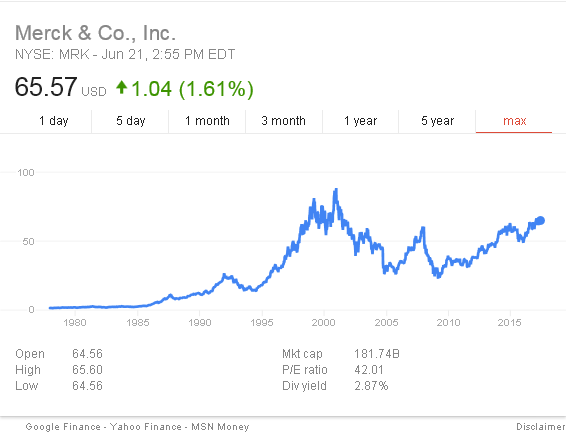
In 2001, the FDA approved Bextra only for arthritis and menstrual cramps. It rejected the drug in higher doses for acute, surgical pain. Bextra, by the way, like Vioxx, is a Cox-2 inhibitor. This class of drugs targets and blocks the cyclooxygenase-2 enzyme to reduce inflammation and consequently relieve pain. Cox-2 was trending in 2001, so much that during my PhD studies, a few of our colleagues were doing research on it at our university labs.
Despite the FDA's regulation, Pfizer continued illegally to market Bextra for its "off-label" uses. How? By paying hundreds of doctors and consultants to promote it. When Bextra was taken off the market in 2005 for health concerns, more than half of its profits ($1.7 billion) had come from prescriptions written for uses that the FDA had disapproved. Consequently, Pfizer ended up paying $1.2 billion in fines and class action court settlements. Pfizer denied any wrong-doing.
Pfizer's stock historically peaked at $46 in 2000 (same time as Merck), and by 2010 it had plummeted to $12. Since then, it's been rising steadily and now sits comfortably at $34. Why? Too big to nail.
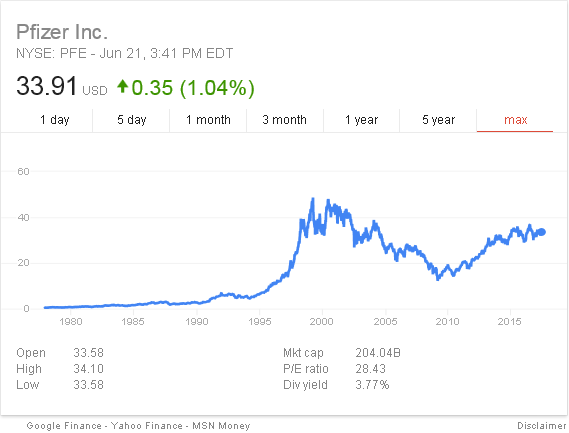
So despite all the counter-indications and potentially deadly side effects, Big Pharma decide to always press forward no matter the costs. You can turn on CNN for one day and watch their commercials (I do). I find there's about 75% of them related to drugs, daily. The commercials show happy people running and smiling, sunshine and picnics, well-being put in slow motion, and at the end of the ads, they announce a few of the side-effects, and written in letters even an ant can't see, even more side-effects. So here we have these cool new meds with side effects that outweigh their benefit. Things that make you go hmmm!
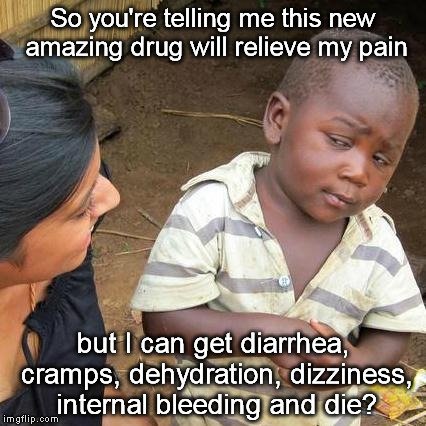
Despite all the warnings and previous scandals, people still buy and doctors still prescribe. Pharmaceuticals spend more on marketing than on drug development! This massive investment is designed to create smartly crafted ads that target the consumer. Marketing can make you sell your mother for a penny if they wanted to. It has become virtually an art, a science, on how to pursuade someone to buy poison.
Cegedim Strategic Data, 2012 U.S. Pharmaceutical Company Promotion Spending (2013)
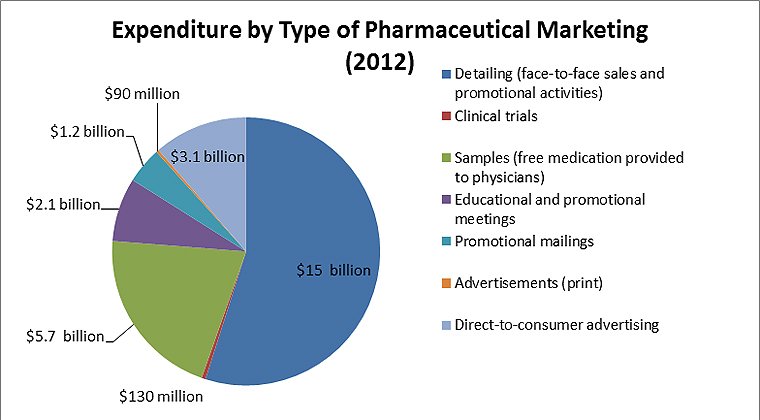
Moreover, luring with gifts, consultancy fees, paid travels, sponsorships, academic funding and cooperation, guarantees the subjucation of hospitals, researchers and doctors. That's why doctors prescribe what they're told to prescribe. Luckily there are many advocates and doctors who oppose this corruption and refuse to abide by the dictating corporations. Although with less prestige, they live with a better conscience.
In the next part, I will explore why Big Pharma despises natural remedies and take a look at alternative medicine. Stay tuned, I hope you're enjoying this serie so far.
"Rest, Neo, the answers are coming."
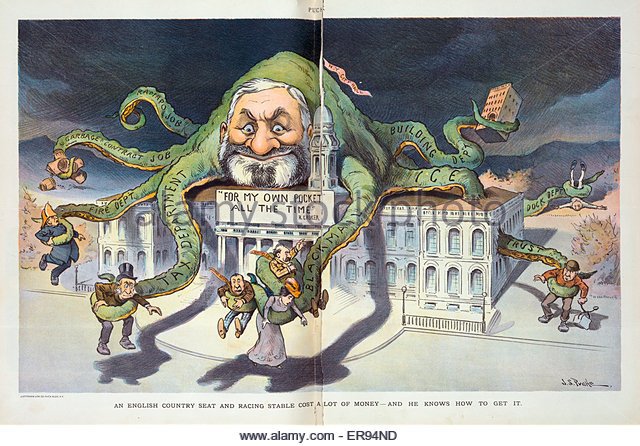
image source
If you missed the previous posts, here they are:
Big Pharma, Part 1: My Awakening
Big Pharma, Part 2: The Drug Development
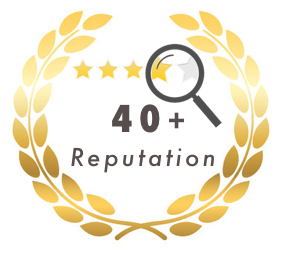
If you like this post, upvote and comment.
If you really like it, resteem.
If you love it, follow 👇 that bird.
Keep going man. Great series. You've done an awesome job.
"Pharmaceuticals spend more on marketing than on drug development!" - that's a pretty fucking crazy thing to think about. And quite frankly - wrong.
It's also a massive problem with the lobbyists that throw loads of money towards congressmen and Capitol Hill - I think we'd eliminate a good portion of this problem if that shit stopped and we made that practice illegal. How many other corrupt policies would be hit by that, too?
Cheers man. You've done well. Always have my support.
If we could remove subsidies andexcess regulations, we'd end cronyism and have much more freedom. Too bad so many people struggle to see that.
I completely agree.
There's a lobby for virtually every sector. Just look at the environement, Monsanto, oil companies! Sometimes I feel sorry for demonstrators and advocates, despite their honorable intentions, the fact remains that they're fighting an uphill fight with Goliathes. The system needs a dramatic overhaul if the society wants a true change.
I know man. It's ridiculous. Money needs to get out of politics - it's such a dirty, corrupt practice.
I recall doing some research on Merck since that controversy and they appeared to have made some significant changes in their procedures.
Companies often make mistakes, and it's easy to do so when you believe in your products and people... But that's certainly no excuse to push a product with insufficient research.
How much of an effect do you think the FDA's regulations have, either negatively (preventing good treatments from hitting the market) or positively (preventing badtreatments Fein reaching it)?
I better hope so that Merck changed their protocols! I haven't done much research into the FDA's practices, but considering the powerful pharmaceutical lobby, one can imagine their influence on politicians, and indirectly on the FDA. American politics is corrupt from the ground up, and I think the FDA is no exception. As to preventing good treatments from hitting the market, Big Pharma are the masters of that, I'll discuss it in part 4.
I think their influence is overstated in some regards. You mentioned the damage that was done to the stocksof companies who made bad choices... Had they only featured a single product line they likely WOULD have gone out of business. Can you think of companies who have had significant repeat events and actually recovered?
I
Also, any insight front your background on whether the FDA or US Gov provides subsidies or grants for specific research projects in the medical field?
AFAIK the FDA doesn't fund any research, that is mainly done by the governmental agency NIH (National Institutes of Health, https://www.nih.gov/). For example, an annual academic research grant can be $1 million and up. Grants are usually given for a period of 2-3 years before they can be applied for renewal. Here in Canada the budgets are way less than that. One time one of our department researchers got a $500,000 grant. We felt like peasants, because most grants were in the range of 80-100k.
One thing I admire about the USA is (I think 25 years ago) when the recession was hitting hard, the US gvmt faced the decision to cut funds for research. They wisely chose not to do so, and the american research has boomed since then.
very informative
thank you.... and, add please links for previous two parts.
Done, I put them at the end of the article.
Peace, Abundance, and Liberty Network (PALnet) Discord Channel. It's a completely public and open space to all members of the Steemit community who voluntarily choose to be there.Congratulations! This post has been upvoted from the communal account, @minnowsupport, by drakos from the Minnow Support Project. It's a witness project run by aggroed, ausbitbank, teamsteem, theprophet0, and someguy123. The goal is to help Steemit grow by supporting Minnows and creating a social network. Please find us in the
If you like what we're doing please upvote this comment so we can continue to build the community account that's supporting all members.
Found this series on a resteem, first one I've read brilliant will read the rest and follow this series very interesting.
Have had a few questions with doctors about what they prescribe - asked one if they could give us a natural remedy, he laughed and said can only prescribe what the chemist has next door which is link to my computer.
I too wanted to talk to my previous doctor about a non-prescription alternative, but seeing him so stubborn I didn't bother wasting my breath with it. His attitude spoke loud and clear.
Pharma has become a racket. It's no longer concerned with helping the sick to get healthy, it's about getting us strung out like junkies for the rest of our unnaturally shorten lives
Meanwhile, the patients languish in long lines and stacks of paperwork to hear that their insurance wont cover the expensive meds. We're living this nightmare. My heart breaks for people that have to go through this as their loved one is dying slowly. I wouldnt wish this on anyone. Thanks for getting the word out. Resteemed
Indeed. That's why many patients lose faith in the system and go elsewhere for treatment. As far as India and China. And guess what, even Cuba! Cuba has some of the best doctors in the world, believe it or not, and the treatments there are a fraction of what a patient can pay in the USA. An operation that would cost 100k in the USA, costs like 5k in cuba, with PREMIUM patient care. All you need is a plane ticket and the willingness to dissociate from that corrupt system. They demonized Castro for a long time, but despite the embargo, Cuba has universal healthcare and free education. Can the USA beat that?
Love it man. Its funny because I'm a registered nurse but I try and never take any medicine for anything (I'm young) because we are always hearing about how this or that drug can now put you at increased risk for _______. Exercise and eating healthy does wonders for your body. Enjoying your series so far, keep it up!!
I feel the same way and try to keep away from drugs as far as possible.
Keep the information coming ...
With your support, I surely will :)
Thanks for educating! I resteemed your post.
Thank you. Don't forget to check out part 4 if you missed it.
Thanks! I did miss it!